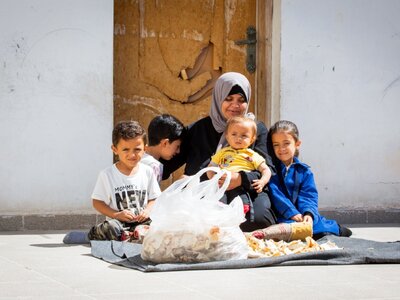Jordan
- 21.4%
- are unemployed
- 76%
- of refugees are food insecure
- 11.5 million
- population
Jordan is a resource-poor, food-deficit country, with limited agricultural land and increasingly frequent climate-related shocks.
Over the past decade, its economy has remained stagnant and unable to generate sufficient employment.
Jordan hosts the second-largest number of refugees per capita worldwide. As of January 2024, some 730,000 refugees were registered with UNHCR, 81 percent of whom were living within communities and 19 percent in the Zaatari and Azraq refugee camps.
These refugees experience worrying levels of food insecurity, while the numbers add unprecedented pressure on Jordan’s budget, natural resources, infrastructure and labour market.
The World Food Programme’s support includes food assistance for vulnerable refugees, technical assistance for the government’s national social protection programmes and expanding climate action.
What the World Food Programme is doing in Jordan
-
Refugee response
-
Through cash-based transfers, WFP provides monthly assistance to vulnerable refugees, primarily Syrians, both in and out of camps. This helps refugees to cover their essential food needs, including buying food from 200 WFP-contracted shops. WFP is planning work with UNHCR to promote economic participation of refugees so they can become self-reliant, while addressing their immediate needs.
-
Social protection
-
WFP supports the Government of Jordan in designing and implementing effective, inclusive and shock-responsive social protection schemes through technical assistance and capacity strengthening. Working with The National Aid Fund, the primary governmental social safety net agency, WFP provides technical support to ensure inclusion, analyse impact and enhance accountability to the people WFP serves. WFP works with the Ministry of Social Development to improve its emergency preparedness, shock responsiveness and impact, and to develop digital systems for enhanced service delivery.
-
School meals
-
WFP supports the Ministry of Education with the National School Feeding Programme, the primary social safety net for children. Aligned with the National School Feeding Strategy (2021-2025), WFP provides nutritious meals (a baked pastry, a vegetable and fruit) to 90,000 children in public schools within poverty-stricken areas. A ‘home-grown’ model empowers women in community-based kitchens and supports local farmers and bakery workers. Additionally, WFP distributes fortified date bars to 430,000 vulnerable Jordanian and refugee children.
-
Climate action
-
WFP is planning activities in soil and water conservation, management of rangelands and forests, and seedling production, focused on locally suited and native species. Furthermore, WFP is working with The National Center for Security and Crisis Management to provide training in early-warning systems and disaster risk management.
-
Food security governance
-
Under the leadership of the Ministry of Agriculture, WFP is developing the first management information system for food security monitoring, reporting and early warning. Additionally, WFP is establishing a roadmap for food system transformation, to coordinate the efforts of all stakeholders in this field. WFP is also developing several knowledge products for evidence-based policy decisions focused on food-consumption patterns, food waste and nutrition.
-
Innovation
-
Since 2021, WFP has developed four multi-stage support programmes, engaged with more than 150 entrepreneurs, provided US$1.5 million in direct funding support and contracted services to start-ups, and integrated start-up solutions into two WFP programmes at scale. This covers areas including food and water security, livelihoods, nutrition, climate and agricultural technology.
Jordan news releases
Go to pageFind out more about the state of food security in Jordan
Visit the food security analysis pageOperations in Jordan
Contacts
Office
Al-Jubaiha, Rasheed District, 79 Al-Wefaq Street, P.O.Box: 930727, Amman 11193, Jordan.
Amman
Jordan







